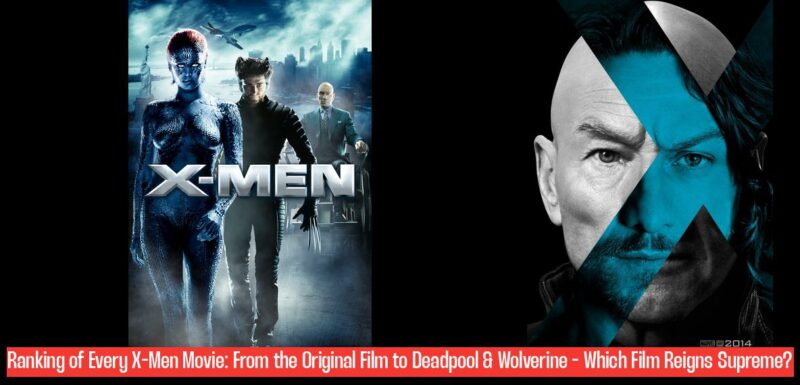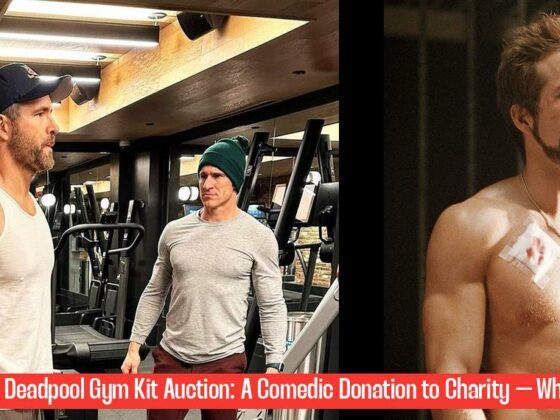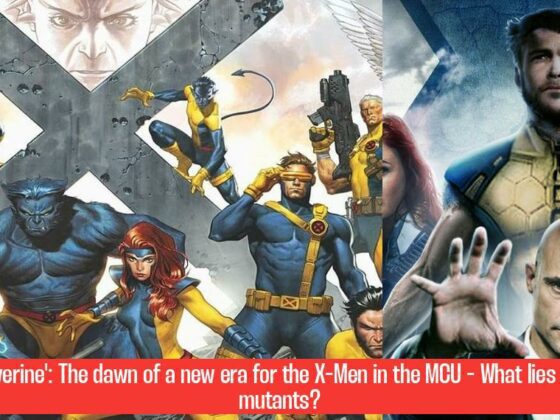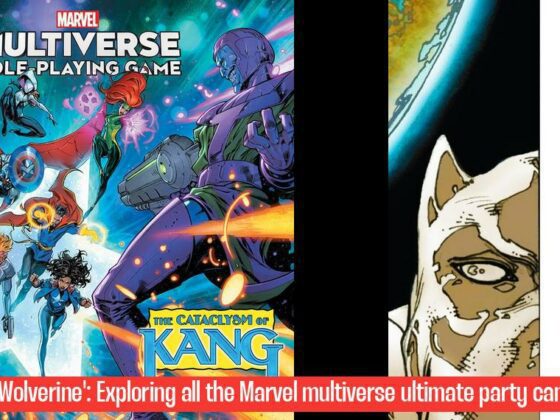Every X-Men movie, ranked: From the original film to Deadpool & Wolverine
Before the MCU assembled The Avengers in 2012, another Marvel Comics superteam had already gathered on the silver screen. While there is often a debate among fans about which squad is superior, there’s no doubt that the X-Men films have been just as much as a steady presence in cinema since their debut in 2000, with its mutant superheroes fighting bigoted villains and oppression in more than a dozen films and spinoffs.
With 20th Century Fox originally holding the film rights to the franchise, there was a time when it seemed these movies might be done for. But now, Disney (which already owns Marvel Studios) has since reclaimed the rights to these characters when it purchased Fox and is beginning to incorporate them into the MCU — kicking off the “Mutant Era” with 2024’s Deadpool & Wolverine.
As Marvel Studios CEO Kevin Feige told EW in 2024, “The notion that, all these years later, we’re in a world where [Hugh Jackman] is Wolverine, and Deadpool and all of those X-Men characters are together under the same roof, is a pretty amazing quarter-of-a-century experience.”
While we welcome the cinematic X-Men back to where they belong under the Marvel umbrella with the release of Deadpool & Wolverine, find out where this latest superhero flick ranks among all of the X-Men films.
13. X-Men Origins: Wolverine (2009)
— Spotlight on WNBA’s Off-Court Activism and Impact in 2020 Social Justice Movements
The worst superhero movie ever made, the first post-trilogy X-Men film is less of a spinoff than a spinoff sizzle reel, with Ryan Reynolds’ scene-stealing Deadpool and Taylor Kitsch’s scene-wrecking Gambit jockeying for attention with a parade of C-listers (the Blob). Everything about the movie is incoherent — the tone, the bizarrely twisted plot, the title. But the real sin is how, by setting the action before Logan loses his memory, Hugh Jackman is stuck playing a pretty standard, boring action hero. It’s a Wolverine movie without Wolverine, which is to say, not really a movie at all.
12. Dark Phoenix (2019)
Simon Kinberg previously co-wrote The Last Stand, so his feature-film directorial debut marks his second go-round adapting the Dark Phoenix saga to the big screen. Unfortunately, Sophie Turner actually has a worse downward spiral than the original big-screen Jean Grey, Famke Janssen, with a storyline that awkwardly tries to mesh inexplicable cosmic energy with unobserved paranoia about female power gone amok. The result is a totally flavorless film that nevertheless conjures up some interesting new developments for the franchise — finally, the X-Men get along great with the President of the United States! Also, god love James McAvoy, he gives one last great performance as Professor Charles Xavier in this wreckage.
11. X-Men: The Last Stand (2006)
Take one of the best story arcs in X-Men history. Then combine it with a completely different story arc from a completely different corner of X-Men history. Then kill off a central character with zero fanfare. Then try to awkwardly launch a next-generation X-Team inside the concluding saga of the first X-Team. Then hand it to your director and hope he can make it work. Oh, and your director is Brett Ratner.
10. X-Men: Apocalypse (2016)
Bryan Singer’s franchise swan song is a mess of motivations, and a couple key First Class-ers look too bored to even sign their checks. Can I offer a modest defense of this immodestly garish piece of trash? The absurd set pieces have a beefcake-camp power, from the Ancient Egypt opening to the nuclear montage to Magneto’s vengeful return to Auschwitz. Three out of four characters don’t do anything except stand around looking cheesy-glorious in costumes that look Broadway-ready. A waste of comics inspiration and a lot of acting talent, but X-Men: Apocalypse anticipates the polychromatic post-gritty turn in superhero movies like Thor: Ragnarok (2017) and Aquaman (2018).
9. The Wolverine (2013)
A deceptively small-scale crime thriller with a propulsive B-movie sensibility and a mournful sincerity that makes other blockbusters look plastic by comparison. Hugh Jackman digs deep to find new poignance in an older, sorrowful Wolverine, living hermetically in the wilderness. He’s a dead man walking, haunted by visions of old lives and lovers. And then, through a series of strange circumstances, he lands right in the middle of a Tokyo gang war encompassing yakuza, ninjas, and a giant samurai cyborg. I’ve come around on the samurai-borg, and I think The Wolverine succeeds as a legitimate pulp adventure, with a great ensemble cast and action that feel uniquely gravitational in a typically greenscreen-y franchise.
8. Deadpool 2 (2018)
I worry sometimes that Deadpool will become our generation’s Austin Powers, a quotable spoof icon who overstays his welcome. This satiric sequel comes close to extending the joke too far, and the plot-starting death of Vanessa (Morena Baccarin) is a lazy-rude contrivance. Still, the screenplay by Rhett Reese, Paul Wernick, and Ryan Reynolds finds a new gear as a far-flung superteam riff, letting performers like Julian Dennison and Zazie Beetz shine.
7. X-Men (2000)
The film that started it all is an awkward but fascinating relic of an era before superhero movies became mainstream. Like every entry in the X-Men franchise, it feels like several oppositional movies in one. The central Wolverine-Rogue surrogate-sibling relationship is strong, with Hugh Jackman cementing Wolverine as a big-screen star right out of the gate. And Bryan Singer arguably doesn’t get enough credit for defining a certain brand of black-leather realism five years pre-Batman Begins. In the demerits column, an excess of pilot-episode exposition, several characters who let their ridiculous costumes do the talking, and that line about the toad and the lightning.
6. Deadpool & Wolverine (2024)
The only thing that could bring Hugh Jackman out of Wolverine retirement was Ryan Reynolds (and, one would assume, a hefty paycheck). Though the Aussie actor said goodbye to his X-Man after 2017’s Logan, he couldn’t resist reuniting with Reynolds — 15 years after X-Men Origins: Wolverine! — in an irreverent and meta third installment of the Canadian’s Deadpool films. Deadpool & Wolverine throws a lot in your face (sexual innuendo intended). Is that one of many surprise cameos in Reynolds’ red latex pants or is he just happy to see you? Honestly, it’s probably both. But if you thought Avengers: Endgame was packed full of characters, this is like that but for the legacy superhero movies from the old days of 20th Century Fox. It also served as an exciting launch for the MCU’s “Mutant Era,” with the X-Men officially joining the Disney/Marvel party. In Deadpool terms, it primed us to unhinge our jaws and take it all in.
5. Deadpool (2016)
Your mileage may vary, and in its own meta-spoof way, Ryan Reynolds’ X-parody turned out to be as influential for superhero-movie culture as The Dark Knight (2008) and The Avengers. I have complicated feelings in general about this R-rated farce, which blends over-the-top bloodbathery with hit-or-miss gags. Credit Reynolds for finding chatty sweetness in his masked assassin — and for giving new life to the film series by embracing the intrinsic humor of the franchise’s junky failings.
4. X2: X-Men United (2003)
The year 2003 was a long time ago, and the opening Nightcrawler scene could still be the best action sequence of the superhero movie era. And that fleet-footed BAMF-happy opening sets the tone for an X-Men sequel that is lighter, faster, and funnier than the first film. The mere fact that X2 is such a better version of X1 made its reputation — and helped to obscure the fact that X2 also demonstrates problems that would define the franchise. There’s the character pile-up, the constant fascination with Cerebro, and the complete inability to figure out what to do with Storm (Halle Berry), among others. But there are also scenes like Iceman (Shawn Ashmore) “coming out” as a mutant to his parents or the government attack on the X-Mansion that get to the core of the X-Men misfit-paranoia mythology like nothing else in the series. Also, any film that briefly makes an action hero out of Alan Cumming earns immediate grade inflation.
3. X-Men: First Class (2011)
Nothing against the emo nihilism of the original X-Men trilogy, but in the best prequel ever made, director Matthew Vaughn and returning producer/co-writer Bryan Singer crafted a new kind of mutant movie. Suave and sexy, X-Men: First Class is most of all an opportunity for Michael Fassbender and James McAvoy to play Magneto and Professor X as two flavors of young hero-hunk — the former tormented, the latter amused — facing off against Kevin Bacon’s Sebastian Shaw, a laugh-riot monster in a villainous ascot. First Class was engineered out of a few different spare-parts spinoffs, and it has its share of frayed edges. This is the beginning of Jennifer Lawrence spending a decade with nothing to do in the X-Men movies. First Class doesn’t have much to do with the comics and throws the movies’ continuity out the window — which could explain why it’s such an unencumbered, rollicking entertainment.
2. Logan (2017)
A hard-R spinoff for Wolverine, director James Mangold’s violent road odyssey looks back even further in film history: There’s no single moment in any X-Men movie more beautiful than Professor X (Patrick Stewart) waxing poetic about watching Shane (1953) one whole cinematic century ago. The ultraviolence hits an unsteady critical mass point somewhere around the arrival of the Wolverine clone — and all the gore can feel at odds with the elegiac tone. With Hugh Jackman finding grace in his epic hero’s adventure, he never looked worse, he never looked better.
1. X-Men: Days of Future Past (2014)
This prequel-sequel is a whirling megamovie, with X-Men casts past and present in a giant-size adventure. The plot depends on absurd contrivances — Shadowcat (Elliot Page) has time-travel powers? — and the massive size of the ensemble means that a lot of characters get short shrift. On one hand, that’s the point: This is an Irwin Allen superhero movie, skipping so quickly between events that it’s impossible to get bored. Along the way, Bryan Singer delivers visual-feast action scenes, showcasing deep-cut mutants Quicksilver (Evan Peters) and Blink (Fan Bingbing) while giving Wolverine the chance to mentor the next generation. Or wait, is he mentoring the previous generation? The already fragile internal chronology of the franchise shatters to pieces. Who cares? Sentinels! Peter Dinklage! Nixon (Mark Camacho)! The excess swirls around a deeper story, personified in the contrast of James McAvoy and Patrick Stewart as two eras of Professor X. It’s a paradoxical dynamic: the younger man gone to cynical seed in a ’70s golden age, and the older in an apocalyptic nightmare future somehow discovering unfathomable reservoirs of hope.
What is the ranking of X-Men Origins: Wolverine among all X-Men films?
X-Men Origins: Wolverine is ranked as the worst superhero movie ever made among all X-Men films.
Who directed the movie Dark Phoenix (2019) and what is its ranking?
Dark Phoenix (2019) was directed by Simon Kinberg and is ranked as the second worst among all X-Men films.



